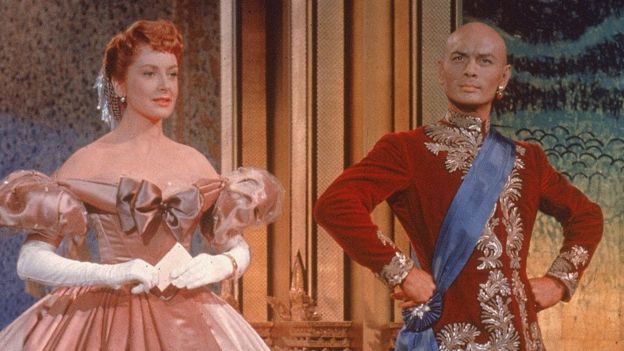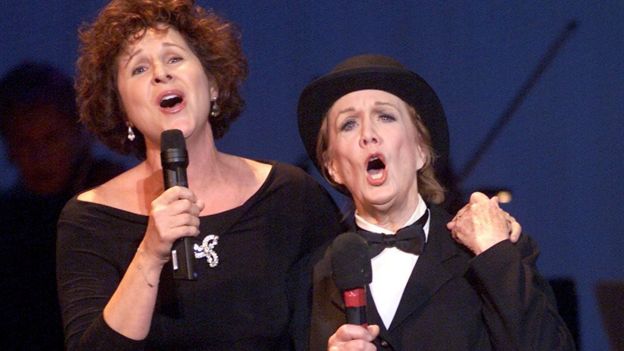Marni Nixon: Hollywood's
'invisible voice' dies aged 86
Marni Nixon, known as Hollywood's "invisible voice", has died aged 86.
The singer appeared, uncredited, on many of the biggest movie musicals of all time - dubbing the voices for Deborah Kerr in The King and I, and Audrey Hepburn in My Fair Lady.
She also sang the high notes for Marilyn Monroe in Diamonds Are A Girl's Best Friend; and "ghosted" Natalie Wood's vocals on West Side Story.
Nixon died of breast cancer on Sunday, her agent confirmed to the BBC.
For most of her career, the classically-trained musician remained unknown. Twentieth Century Fox made her sign a contract saying she would never reveal the ghost-singing on The King and I. The story only came out later, when Kerr herself credited Nixon's work in a press interview.
The clandestine nature of her work led Time magazine to dub Nixon "the ghostess with the mostest".
The singer likened her work to that of a stuntman, and collaborated closely with the stars to perfect the screen illusion.
Kerr "wanted to look like she was really singing", Nixon told the Washington Post, "and wanted to be using the same muscles and the same stretches you do in expressions".
 GETTY IMAGES
GETTY IMAGES
Hepburn even gave Nixon a lift to the set of My Fair Lady every morning; and they worked together to ensure their performances matched.
"I sat in on her singing lessons, so I could hear not only the Cockney and the upper-class British, which are two different voices. But I also had to get her very unique speech patterns, so I had to listen very carefully so I could catch it."
"It's fascinating, getting inside the actresses you're singing for," she told The New York Journal-American in 1964. "It's like cutting off the top of their heads and seeing what's underneath. You have to know how they feel, as well as how they talk, in order to sing as they would sing - if they could sing."
Not every actress appreciated her help, however.
Wood, playing Maria in West Side Story, thought Nixon would be helping out on the high notes. But director Robert Wise had other ideas.
"She didn't know how much of her work would be done by somebody else," Nixon later recalled. "She didn't know that it would all be thrown out and that it would be all my voice. I don't think that Natalie Wood's ego could take that."
Nonetheless, it was Wood's name that appeared on the soundtrack - which went on to sell more than three million copies in the US. As a result, Nixon was not given a share of the royalties, until composer Leonard Bernstein gave up a quarter of one per cent of his own royalty and passed it on to the singer.
Varied career
Born in southern California, Margaret Nixon McEathron was an acclaimed musician both before and after her work in Hollywood.
She started playing violin at the age of four and began playing with Karl Moldrem's Hollywood Baby Orchestra six months later. At 11, she won a singing contest at the LA County Fair and decided there and then to abandon the violin.
In 1947, the same year she dubbed her first film, she made her Hollywood Bowl solo debut in Carmina Burana under the baton of Leopold Stokowski.
By this stage, she had also dropped her "hard to pronounce" surname. "Kids at school called me Mac-Earthworm," she said.
 GETTY IMAGES
GETTY IMAGES
Her first job dubbing the voice of a film actress arrived when she was working in the post room at MGM film studios, as a way of covering the cost of her singing lessons.
Composer Bronislaw Kaper, who was working on the score for the film The Secret Garden, stopped her in the corridor and challenged her to sing a song in Hindi. The youngster obliged and her career was born.
But, despite appearing on more than 50 soundtracks, she only sang on screen once - as Sister Sophia, one of the nuns performing How Do You Solve a Problem like Maria? in The Sound Of Music.
In later years, Nixon appeared as a soloist with the New York Philharmonic, performed on Broadway and in opera houses and hosted the Emmy Award-winning children's television show Boomerang.
She also taught at the California Institute of the Arts, and toured for many years with Liberace.
Nixon first had breast cancer in 1985, and wrote in her autobiography of the trauma of appearing on Broadway as chemotherapy caused her hair to fall out when the disease returned in 2000.
She was married three times - first to Ernest Gold, the film composer behind Exodus and On The Beach, with whom she had a son, Andrew Gold, who went on to compose the Golden Girls theme Thank You For Being A Friend.
Her second marriage, to Lajos Frederick Fenster, ended in divorce, while her third husband, Albert Block, died last year.
She is survived by three sisters, two daughters from her first marriage, six grandchildren, and three great-grandchildren.
No comments:
Post a Comment